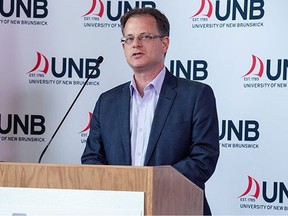Newly graduated teachers from abroad tend to leave province: UNB study
Researcher hopes findings will help address province's teacher shortage

Article content
A researcher at the University of New Brunswick hopes his study on where teachers trained in the province find and keep jobs will shape future recruitment and retention efforts in the school system.
Ted McDonald’s recent study on teacher recruitment and retention found fewer than half of up-and-coming teachers receiving Bachelor’s of Education degrees from New Brunswick’s three publicly funded universities stay in the province and land jobs in public schools.
However, his report suggests 59 per cent of teachers originally from the province do stick around, and while the school system added an extra 1,000 teachers from 2013 to 2021, there’s still a pressing need for them and other education professionals.
The New Brunswick Teachers’ Association has repeatedly raised the alarm over what they say is a growing teacher shortage as teachers are getting burned out and less qualified staff are filling the gaps.
“We do a lot of different analyses of the findings and characteristics of why people stay or leave,” he said. “It raises a lot of questions about why that’s happening and maybe designing some interventions to address it.
“For example, if many BEd graduates from other provinces are leaving the province after they study here, maybe we can look at some programs to encourage them to stay rather than leaving them to their own devices. We also want to understand why teachers are leaving the field before retiring.”
McDonald’s study was led by UNB’s Institute for Research, Data, and Training in partnership with the provincial Department of Post-Secondary Education, Training, and Labour and the Department of Education and Early Childhood Development, which funded the research.
McDonald said his project reviewed administrative records from BEd grads from UNB, St. Thomas University, and the Université de Moncton who earned degrees between 2013 and 2021. He said medicare and health insurance information was also used to determine where grads live, and excerpts from payroll records showed where they had been hired, if and when they left, and what contracts they had while working in the school system.
“We wanted to look at what proportion of BEd graduates move into teaching in New Brunswick, how long they continue teaching, and where they are if they leave teaching,” said McDonald.
“Only around 48 per cent of those graduates actually end up teaching in New Brunswick, which is surprising. Only 10 per cent of graduates from another province or country stayed in the province, so we noticed a big difference based on where you come from.”
McDonald’s study also found 92 per cent of BEd grads were still teaching after five years in the classroom, with eight per cent switching careers. He said two to three per cent of teachers leave each year. His report didn’t consult any individual teachers, but looked at characteristics contributing to their departures, such as not being from New Brunswick, being single, and not having a permanent contract.
“When we looked at those people who are leaving teaching, a significant portion of them are doing it before retirement age,” he said. “Only a third left after 20 years of teaching experience, and 67 per cent had less than that. Twenty per cent of those who left teaching did so in the first five years.”
McDonald said his study found most teachers who leave the profession are staying in the province and are potentially available to return to the classroom.
McDonald said a similar research project is in the works for nursing graduates.
“As well as we’ve been doing with getting teachers into the system, it’s not going to be enough given the large increase in the population of school-aged kids in the province,” he said.
“The teacher shortage is a microcosm of the labour shortage New Brunswick is looking at because of its aging population and growth in population and demand for services.”











Postmedia is committed to maintaining a lively but civil forum for discussion. Please keep comments relevant and respectful. Comments may take up to an hour to appear on the site. You will receive an email if there is a reply to your comment, an update to a thread you follow or if a user you follow comments. Visit our Community Guidelines for more information.